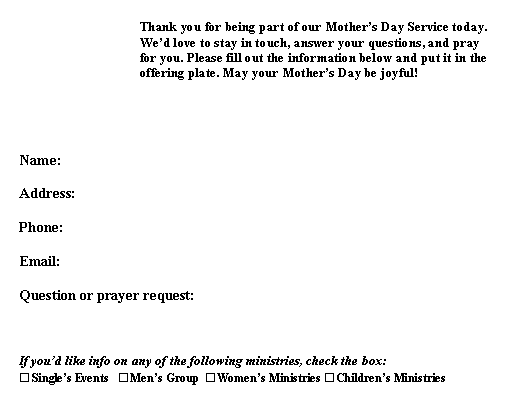 True story here: a growing church of 1800 (from 300 only three years earlier) decided to start a Men's Ministry with a Bible Study for men. Lots of prayer and encouragement from the pulpit, plus a splashy PowerPoint show, encouraged men to come. The night of the study the staff set up 200 chairs in anticipation. Three men showed up.
True story here: a growing church of 1800 (from 300 only three years earlier) decided to start a Men's Ministry with a Bible Study for men. Lots of prayer and encouragement from the pulpit, plus a splashy PowerPoint show, encouraged men to come. The night of the study the staff set up 200 chairs in anticipation. Three men showed up.
What went wrong? Following are five staff assumptions about their advertising approach to this even and why they didn't work.
#1 The staff assumed men would do what the Power Point® told them to do.
The colorful, eye-catching PowerPoint® slide show ended with a call to "sign up in the church lobby." What they wanted to be a call to action was in reality the kiss of death to any event sign-up.
After church is over, does any man to say to his wife (please forgive any implied sexism in this illustration), “Honey, would you please wait for me in the car while I find out where to go sign up for the men’s Bible study?” It doesn’t happen. I know my own husband’s most pressing thought after church is–where are we going for lunch? Following the thought of food is football, basketball, or hockey, depending on the time of year. Most men I know, godly guys that they are, are similar in their after-church priorities. Trying to find a table in the church lobby to find out information about something that you may or may not be interested in simply is not a priority, even if by chance a man remembers he was told to do that.
Any time you require people to take a second step (call the church office for more information, sign up in the lobby, etc.) to find out essential details that they need to show up for any event, you will drastically cut down attendance.
#2 The staff assumed that men would remember the connecting details from the PowerPoint® announcement presented every Sunday.
Most men don’t. PowerPoint® is great for song lyrics, to set a specific mood for worship, or for graphics to reinforce a story or theme, but few men (women or teenagers) sit in worship, pencil in hand, ready to take notes off of a PowerPoint® presentation. A bulletin insert, ready to post on the refrigerator with all the details on it, would have been much more useful. Wives and girlfriends post it and remind the significant men in their lives about it. Yes, it might seem retro, old-fashioned, a bother to produce, but it works.
#3 The staff assumed that having the pastor encourage the men to come to the event meant something to the men and would make them want to come.
It usually doesn’t. Pastoral leadership doesn’t have the influence it once did. We live in an irreverent age, an age that doesn’t admire authority. A personal invitation can be powerful, but pleas from the pulpit to attend events that aren’t particularly appealing to uninvolved church members, men or women, are seldom heard, let alone acted upon. [Read more...]









